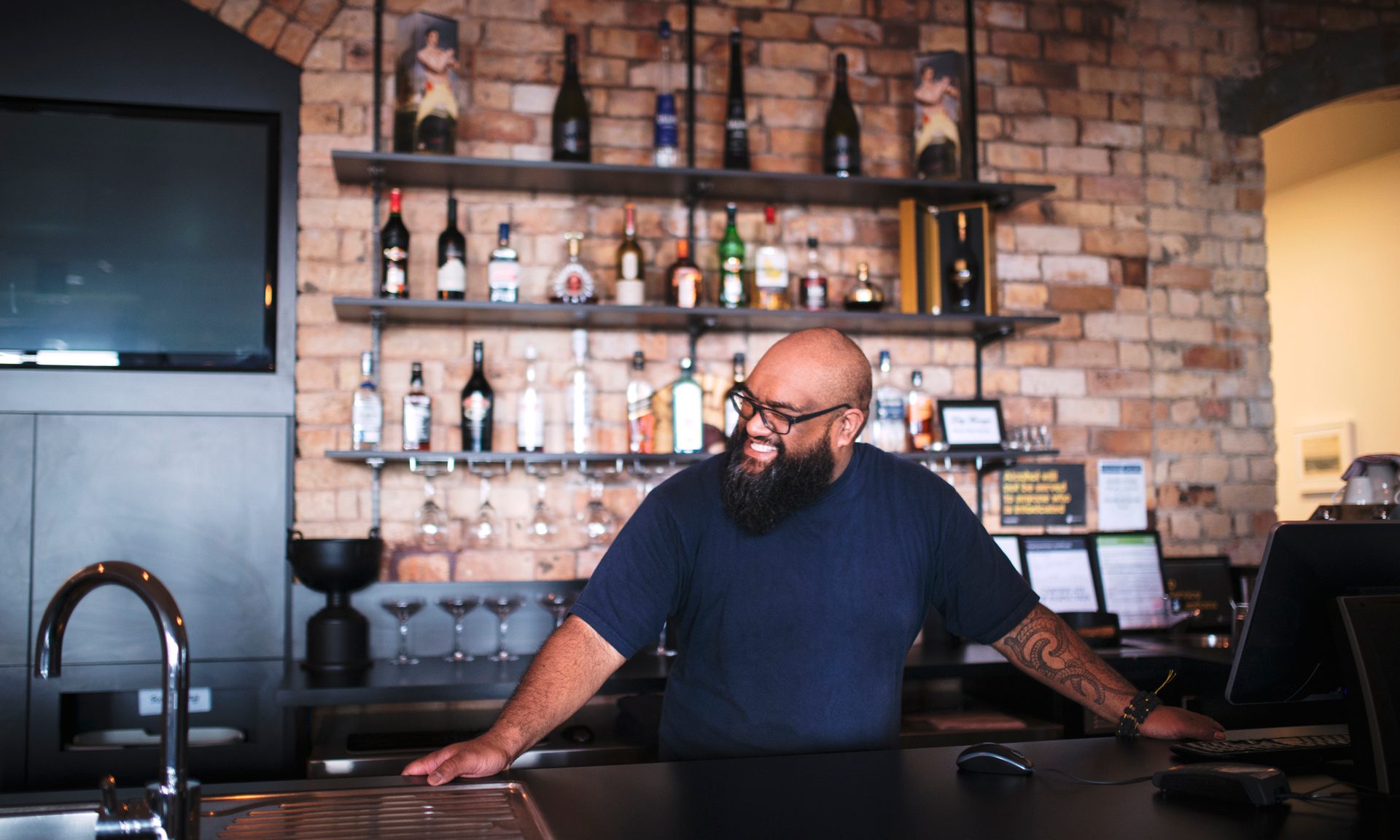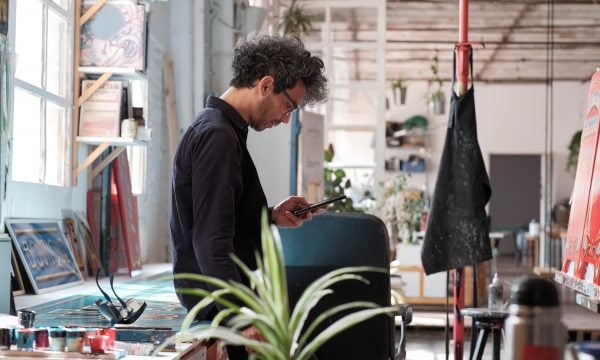Liquor Liability Insurance for Small Business
Liquor liability insurance protects small businesses that manufacture, sell or serve alcohol.

Many, or all, of the products featured on this page are from our advertising partners who compensate us when you take certain actions on our website or click to take an action on their website. However, this does not influence our evaluations. Our opinions are our own. Here is a list of our partners and here's how we make money.
If you run a business that sells alcohol, you already know how alcohol changes how you operate from other small businesses. When you sell, serve or manufacture alcohol, you’ll need a liquor license, plus, you must abide by a variety of alcohol-specific regulations. And because selling alcohol can be a potentially lucrative, but also risky part of your business, you may want to look into an additional business insurance option — liquor liability insurance.
In this guide, we’ll explain everything you need to know about liquor liability insurance for small business, including coverage, cost, where to get it and how to decide if it’s right for your business.

Save up to 30% on business insurance
NerdWallet Small Business helps you get real-time quotes from 30+ insurers, and instant access to your Certificate of Insurance (COI) through our partner, Coverdash.
Liquor liability insurance overview
Liquor liability insurance (sometimes also referred to as dram shop liability insurance) is a form of business liability insurance that protects small businesses that manufacture, sell or serve alcohol. This type of insurance typically covers claims of bodily injury or property damage made against your business as a result of actions by intoxicated persons to whom you served or sold alcohol.
Whereas most businesses are protected from these types of claims by their general liability insurance, most general liability insurance excludes coverage for alcohol-related claims, making this form of insurance particularly worthwhile for restaurants, bars, breweries, wineries and any business that deals with alcohol as part of its daily operations.
Additionally, liquor liability insurance is even more important for businesses operating in states that impose dram shop laws. These laws hold businesses responsible for the actions of an intoxicated person to whom they served alcohol, especially if the person served was visibly intoxicated. These laws vary in their specifics, but on the whole, they make it easier for your business to be sued for alcohol-related incidents. Currently, 43 states have dram shop laws.
Which businesses need liquor liability insurance?
Any business that sells or serves alcohol as part of its daily operations should consider investing in liquor liability insurance. These types of businesses may include:
- Restaurants.
- Bars.
- Wineries or breweries.
- Hotels.
- Caterers.
- Event facilities.
- Liquor stores.
- Grocery stores that sell alcohol.
Additionally, it’s worth noting that depending on the state where your business is located, you may be required to get liquor liability insurance in order to be approved for a liquor license. There may be other scenarios in which your business is required to have this type of insurance as well; for example, if you’re applying for a business loan, you may need to show proof of liquor liability insurance to a lender.

Save up to 30% on business insurance
NerdWallet Small Business helps you get real-time quotes from 30+ insurers, and instant access to your Certificate of Insurance (COI) through our partner, Coverdash.
Liquor liability insurance coverage
Whether or not your state imposes a dram shop law, liquor liability insurance can be essential to protecting your alcohol-serving or selling business. Liquor liability insurance generally covers any bodily injury or property damage caused by an intoxicated person that your business served alcohol to, even after they leave your business location. More specifically, this may include:
- Assault and battery: This type of insurance can cover you if an intoxicated person is involved in a fight or other physical altercation and someone sues.
- Sexual assault or harassment: If an intoxicated person assaults or harasses someone, you’ll be protected under this type of insurance.
- Property damage: You’ll be covered if an intoxicated person damages someone else’s property.
- Bodily injury: If an intoxicated person injures themselves and sues, liquor liability insurance will protect you.
- Drunk driving: If an intoxicated person drinking at your business leaves and drives a car, liquor liability insurance will protect you in the case of a lawsuit from any resulting damages or injuries.
In these situations, liquor liability insurance will cover legal costs — court costs, lawyer’s fees and settlements — if your business is sued. However, coverage can vary based on the individual policy and the state your business is located in (because each state has its own regulations and laws regarding dram shop liability).
Situations and instances that are not covered under liquor liability insurance include:
- Underage drinking: Liquor liability insurance will not protect you from claims involving underage drinking.
- Business property damage: Your business property is not covered under liquor liability insurance. For this type of protection, you’ll need commercial property insurance.
- Libel and slander: Other types of damage, like libel and slander, are not covered under this type of business insurance.
- Sickness or illness from manufacturing: If your business manufactures alcohol and customers become sick as a result of a production error, this will more than likely be covered under product liability insurance instead of liquor liability insurance.
Liquor liability insurance vs. host liability insurance
Whereas liquor liability insurance protects businesses that sell or serve alcohol as part of their typical operations, host liability insurance protects your business if you serve alcohol or allow it to be consumed at an event you host.
Typically, host liability insurance is included in your business’s general liability insurance policy and therefore covers you against any bodily injuries or property damage lawsuits that occur as a result of the actions of an intoxicated person who drank alcohol at an event you hosted. Essentially, host liability insurance protects businesses that are not in the day-to-day practice of serving or selling alcohol.
Liquor liability insurance cost
As with most business insurance policies, the cost of liquor liability insurance will vary. Much of this variation is due to the different laws states impose on businesses that serve or sell alcohol. In Michigan, for example, any retailer applying for a liquor license must be able to show a liquor liability insurance policy of at least $50,000 in coverage. Generally, it’s safe to say that the stricter the dram shop laws in your state, the more expensive your liquor liability insurance policy will be.
Additionally, the cost of your policy can also be dictated by a number of other factors, including the size of your business, the type of business (bar vs. grocery store, for example), how much alcohol you sell, your claims history and the amount of coverage you want with your policy.
For example, according to money management site howmuch.net, the average liquor liability insurance cost ranges from $900 to $1,200 per year. Online insurance marketplace, Insureon, on the other hand, reports that their customers often see median annual costs ranging from $255 (for retailers) to $545 (for restaurants) to $2,060 (for bars). These costs, however, also depend largely on the amount of your policy — for bars, the median coverage amount from Insureon is $2 million; for restaurants, it’s $1 million.
To mitigate the cost of your liquor liability insurance, you can work with an insurance provider to see if you can incorporate this type of insurance on top of your other insurance policies, in what is referred to as a business owner's policy. By bundling different types of business insurance with the same provider, you can often receive your policy at a lower rate.
Moreover, simply by lowering your risk for a claim or lawsuit, you can often find more affordable options for liquor liability insurance. Showing an insurance provider that you’ve hired professional employees, trained them thoroughly, and mitigated your business’s risk in other ways (like enacting a strict ID policy and serving non-alcoholic beverage options) can help lower the cost of your policy.
Where to get liquor liability insurance
If you’re searching for this type of insurance, you might consider starting with your current business insurance company, if you have one. If you don’t yet have business insurance or your current provider doesn’t offer this type of insurance, look into the following optoins:
Work with a broker or agent
Although working with an insurance broker or agent can be more expensive than finding liquor liability insurance on your own, it can be worthwhile if you’re buying business insurance for the first time. An insurance broker or agent will work with you to discuss your business needs, get quotes from different providers and compare the quotes you receive to determine which one can offer you the best policy.
To ensure that you’re using a trustworthy insurance broker or agent, you may ask for recommendations from fellow business owners or consult any resources offered by your local chamber of commerce.
» MORE: How to get business insurance
Use an insurance marketplace
For a more affordable way to get liquor liability insurance, you might decide to utilize an insurance marketplace like CoverWallet and Simply Business. These companies allow you to enter your business information online and based on this information, they generate quotes from a variety of different insurance providers. You can then compare the best options and choose the one that works for you.
Go directly to an insurance provider
If your current provider doesn't offer liquor liability insurance, you can look to local or national insurance companies to meet your needs.
As an example, Progressive offers liquor liability insurance through the commercial branch of its business. You can add this type of insurance to your general liability policy or purchase it separately. You can apply for a quote from Progressive online or call to speak with an insurance representative. According to its website, liquor liability insurance costs are determined by sales, profession, location and claims history.
You might also consider a specialized provider, like the Food Liability Insurance Program. FLIP is an online insurance provider that offers policies for a variety of food- and beverage-based businesses. You can purchase a bundled policy for liquor and general liability, or liquor liability insurance on its own. Although the final price will vary based on your state, according to the FLIP website, annual coverage for both liquor and general liability insurance can start at $498, or $199 for liquor liability only.
FLIP also provides one- to three-day liquor and general liability insurance coverage for businesses that need special event insurance. You can buy a FLIP insurance policy online and call or live chat with a support representative to address any questions or concerns.
Ultimately, whichever route you use to get your liquor liability insurance, you’ll want to be sure to get multiple quotes to compare and ensure you’re getting the best and most affordable policy for your business.
This article originally appeared on Fundera, a subsidiary of NerdWallet.
Article sources
NerdWallet writers are subject matter authorities who use primary,
trustworthy sources to inform their work, including peer-reviewed
studies, government websites, academic research and interviews with
industry experts. All content is fact-checked for accuracy, timeliness
and relevance. You can learn more about NerdWallet's high
standards for journalism by reading our
editorial guidelines.
Related articles





